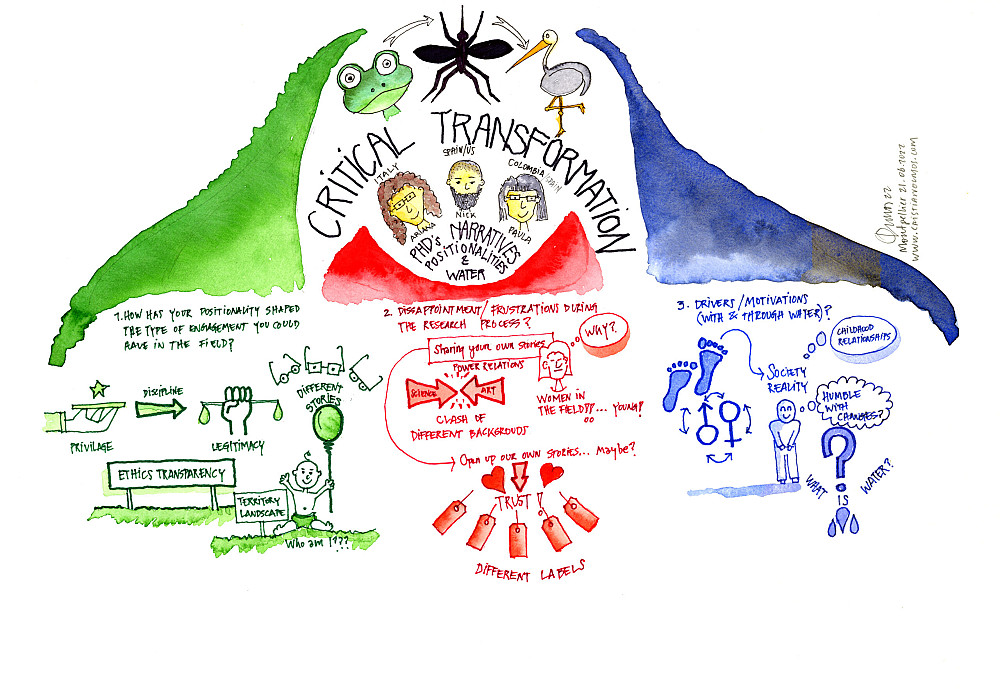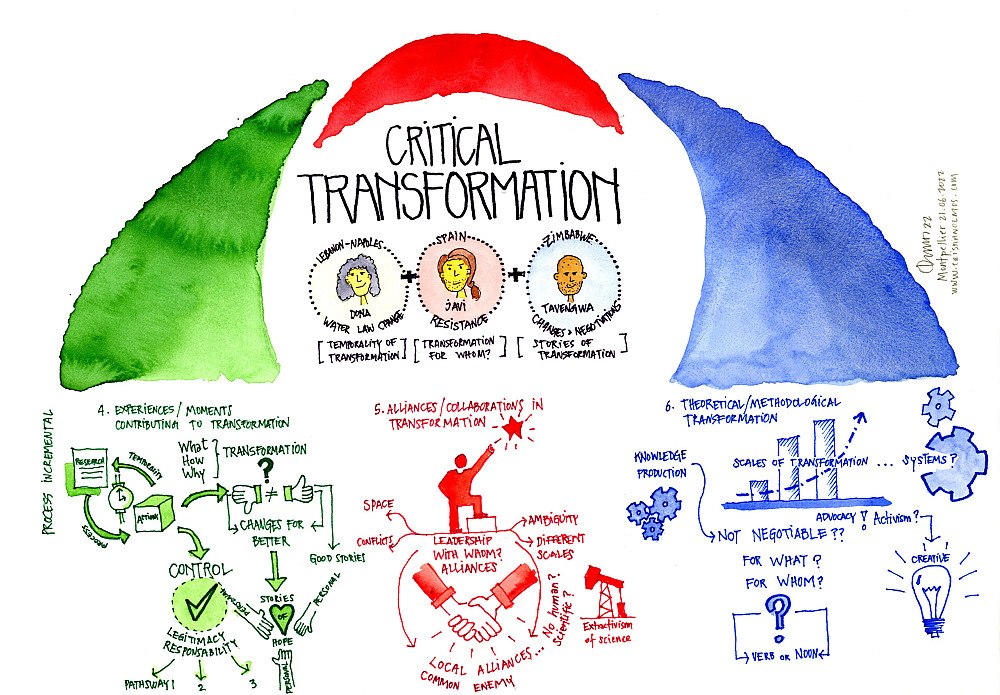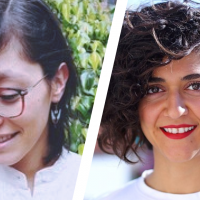[Blog Repost] From Positionality to Critical Transformations in Water Governance
Dona Geagea, Paula Zuluaga Guerra, and Nick Bourguignon present the provocations by a group of young researchers that animated a discussion on critical transformations in water governance at the workshop “Caring matters in knowing water”.
The blog has been re-posted from its original source.
Drawing by Cristian Olmos Herrera
How do we critically reflect about the concept of transformation in water governance? How does our positionality play a role in how we interpret, view and contribute to transformation? How do we transform our own field? Can – and should – academia transform, or be transformed?
These were some of the poignant questions placed at the heart of the discussions organised and led by the early stage researchers belonging to two Innovative Training Networks (WEGO and NEWAVE), alongside PhD researchers from outside these networks (University of Manchester; University of Sheffield; Lancaster University and Institut de Recherche pour le Développement (IRD) / UMR G-EAU), during the workshop “Caring matters in knowing water” organised in Montpellier in June 2022. At the invitation of Prof. Margreet Zwarteveen, our group of early-stage researchers came together prior to the event, shared experiences and struggles from our research, and ultimately plotted the event’s first workshop. We did this based on the understanding that discussions should be held collectively, in a reflexive way and in a grounded manner (bottom-up, experience-based, and intentional). Given our diverse backgrounds, disciplines, histories, and bodies, we felt compelled to provoke by “doing things differently” in a session that unpacked transformation and positionality when working with water. With this aim, we collectively drafted a series of reflexive questions for ourselves and the wider workshop audience, as well as “vignettes” from the field. Six stories narrated insights from our life experience (i.e. fieldwork, previous research, sense of belonging in territory and community). Small group discussions followed the provocation of the vignettes and the questions grounding them. We have attempted to synthesize key insights and take-away lessons below.
On positionality
Guiding questions: How does one’s positionality shape their research and the way they approach water? What is the relation between frustration in research and positionality? What drives our research on water? What do we see with and through water?
“I get frustrated with the labels others assign me! Most of the time I cannot change them even though they affect me and limit my work!”
A group of women researchers shared the difficulties they experience for being women when doing fieldwork. They expressed feeling confronted by the communities they work with when they do not perform according to the role assigned by their gender. They also expressed that “using” and “enjoying” advantages for that same reason, for example by getting access to social spheres that are reserved to women only, can also reinforce specific gender roles and power relations.
Other researchers working on modeling expressed their discomfort with normative ideas that condition or sanction them to be “neutral”. They expressed how these views hinder critical perspectives on modeling and limit the impact of more participative approaches as some models are seen as more “serious” than others.
Reflecting on water research, others expressed that they often felt trans-disciplinary approaches/initiatives are limited by social vs. natural sciences views, especially when working with practitioners. Researchers narrated how they have mobilized different identities and choose nouns and verbs carefully to engage with other scholars as well as informants. When the research question addresses issues of interest to the social sciences, researchers may have to come up with different “hats” that legitimize their research (let alone themselves) in the eyes of the natural scientists, engineers, or even water users. Ontological starting points underpin how different disciplines see and engage with water issues. The research on conflicts and contestations by politically engaged scholar-activists may not chime with the research interests and the disciplinary focus of other researchers, which reflects in how problems are seen and framed across disciplines. In that sense, the group reflected on the fact that these tensions should not be avoided but acknowledged and collectively reflected. This could provide ample space for cross-disciplinary collaboration that recognises ontological divides while working together.
On transformation
Guiding questions: What are the experiences that you would define as contributing to transformation processes or as “transformative” in your research? Where was “water” in this? What are some alliances/collaborations that inspire transformation? How is transformation presented by whom? What are theoretical/ methodological transformations to study water(s)?
“While touted as a successful case, participation is not how activists envisioned it, it has been enclosed, and the original actors have been divided and marginalised. Support that was expected from regional and national actors in the water governance system turned into a penalizing experience for Naples for being a vanguard – holding back funding from it because the new legal structure of its water utility (100% public and preventing its division into sellable shares) doesn’t fit the conventional (desired) legal model open to privatization. Whose agenda is being favored when one type of transformation is enabled and another is pushed to its demise?”
(excerpt from Dona’s Vignette on transformation)
This discussion invited bringing forward theories to approach transformation with its ambiguities – transformation as both creative and as destructive. Reflections highlighted transformation as a goal versus transformation as a process, recognising the entrenched powers in a context of transformation and whom transformation is serving. Transformation is not always just and sustainable, is it? Indeed when we are in it, it is hard to know what the result will be. Transformation ebbs and flows, runs on differing temporalities, and is not a linear process, but rather emerges, and often gradually. Change and transformation are not synonymous, though often we speak of them as such. Change can be understood by some as a shift in parameters (slight in dimension, and can be reversible), whereas transformation is the change in structures and relations which is considered irreversible. But this begs the questions: do we have an illusion of control when speaking of transformation? Who is taking the responsibility to transform, and how? Beyond theoretical differences between the concepts of transformation vis-a-vis change and transition, we concluded that it is necessary to reclaim and defend the emancipatory dimension of change. Without invisibilizing the multiple scales at which transformation can be enacted (from individuals, to communities, to societies), it is fundamental to link research efforts with various forms of activism and advocacy.
Take-away messages: how do we link positionality to critical transformation?
Drawing by Cristian Olmos Herrera
Positionality is essential to transformation. Who we are and how others see us shape our understanding of water and can limit or enable us as critical researchers. Discussing our positionality together is key to learn from each other, to understand what drives us, and to critically reflect on what transformation is and how we want it to happen.
With this in mind and embracing the emancipatory possibilities that transformation can bring we (PhD researchers) collectively worked on three provocations to open a dialogue with senior researchers at the Conference Caring for Water that followed the workshop In a similar way we want to leave these provocations open for the reader to reflect on and interpret their relevance and applicability to their own context..
1. Water scholars should direct their efforts towards resisting “climate coloniality”
We would like to problematize how we transform water research by linking it to climate change and by anchoring it into the history of colonialism, capitalism and intersectional forms of subordinations. This provocation is our way to bring in Fahrana Sultana, Amitav Ghosh and others’ plea to consider the ways in which climate change lays bare the colonialism of the past and the ongoing coloniality of the present into our efforts to critically transform water research.
Climate coloniality
How does it feel?
Is it pain? Is it anger?
Perhaps a lingering sense of grief?
For Farhana it is heaviness,
And for me?
A mixture.
All of the above, but with a taint of guilt,
a pinch of paralyzing horror
and a desire to transform.
Transform this bitter taste and rage
into tides, waves and storms for change.
(excerpt from a Poem by Arianna: On how a woman researcher from Europe feels when decolonising her work)
“With my research I aspire to ‘situated solidarity’ with Semarang-based activists. I have much to learn from their experience and intimate/deep knowledge of how the degradation of the environment they live in is a story of social marginalization and commodification of nature. I have much to write about their refusal of uneven urbanization, and their attempts to address the water crisis in Indonesian cities for what it really is: a political, colonial and capitalist crisis.”
(excerpt from Marie’s provocation: On how a woman researcher from Europe feels when decolonising her work)
2. Water scholars must consider power asymmetries and take heed of the plurality of ways to understand and perform transformation in water governance and water research
Participatory approaches have aspired to facilitate empowerment of marginalized groups and individuals in governance spaces. However, these approaches have also been mobilized to serve dominant agendas, including in water governance arenas. The (mis)use of a concept/term like ‘participation’ has therefore played a double role: as a tool to underpin hegemonic powers and to gain legitimacy. This phenomenon of a “loss of critical nouns”, in Boaventura De Sousa Santos’s words, could become the fate of “transformation” if we don’t take heed of the plurality of ways to understand and perform transformation.
Letter to the last international development agency that rehabilitated our irrigation scheme
Dear Donor,
As I write this letter I am aware that I might not get a reply but that will be painfully fine. In fact you may never get this letter because we don’t have your postal address, we only know your name. In case you are wondering who I am, I am the little girl Sibo, I was five the last time we saw you, and now I am ten.
I thought of writing to update you about the submersible pumps you gave us. They looked beautiful when you orphaned them down the pipes and shut them from the world. They work in silence, and sometimes we do not know if they are working or not.”
Soon after you left –an event you themed handover- it was a literal handover because, for the greater part, the developments were only and only in your hands, and we were reduced to endorsing spectators save for the few who were required for labour- manual labour.
(excerpt from Tavengwa’s vignette: On how transformation can become a way to perpetuate structural inequalities, triggering reflections on what is being transformed, by whom, for whom and to what end?)
3. Water scholars must challenge a neoliberal and western-knowledge oriented academia that limits what we can do and how we can engage with different actors and knowledges
A three-year funding period acts as a disincentive, and even an obstacle, to develop connections with the people we collaborate with while doing our research (from academic peers to policy-makers and local communities in the field), favoring extractivist research. We want an academia that creates spaces and moments for more open and meaningful engagements with people (activists, practitioners, policy makers, citizens). We want to conduct research based on the collective construction of knowledge guided by the interests-needs of local people, yet this is difficult as we still have to comply with a strict timeline based on the production of papers and following what is considered as “legitimate” scientific practice.
We want an academia that acknowledges that these issues do not affect all of us in an equal manner, thus preserving structural problematiques, and that engenders the creation of spaces to thematise, resist and change them. Ultimately we want an academia that allows us to dream of different ways of doing research without dealing with precarious conditions ourselves. It follows that our demand for an emancipatory and structural transformation of how we see and govern water implicates a transformation of our own socio-cultural and material relations, which necessarily includes the academic spaces we construct.
“I feel the urge to acknowledge and emphasize how all my work is the product of a collective work and engagement, of many collaborations and exchanges, many hearts, eyes and brains coming together and engaging in conversations around water…”
(excerpt from Irene’s story: On how academia can hinder collective work)
An invitation for the reader: Daring ourselves to imagine truly different presents
We want to conclude with an invitation for the reader to exercise one of the most emancipatory practices: imagining. We advocate enabling alternatives to emerge, by allowing ripened contexts for critical reflection and experimentation (or tinkering) within academia, water research, and also within water governance at large. Here is our last provocation, as another way to imagine our own academic ambit…
“What about the possibilities of non-individual PhD projects, but ones as collaborations between different actors and across disciplines? This involves finding ways to present and discuss (rather than defend) a thesis that are relevant to the research/case study/project/local context and community itself rather than standardized ways (such as writing a specific number of academic papers published in specific journals)?”
Dear reader, we would like you to imagine with us, and invite you to share below your thoughts. What would you imagine a decolonial water research to look like in your context? How would you change your own work environment? How can your research be transformed to transform the world?






